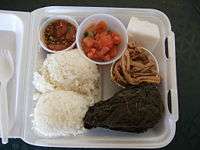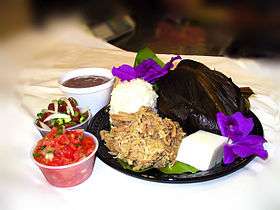Plate lunch

The plate lunch is a quintessentially Hawaiian meal, roughly analogous to Southern U.S. meat-and-threes. However, the pan-Asian influence on Hawaiian cuisine, and its roots in the Japanese bento, make the plate lunch unique to Hawaii.
Standard plate lunches consist of two scoops of white rice, macaroni salad, and an entrée.[1] A plate lunch with more than one entrée is often called a mixed plate.
Origins
Although the exact origin of the Hawai'ian plate lunch is disputed,[1] according to Professor Jon Okamura of the University of Hawai'i, the plate lunch likely grew out of the Japanese bento, because "bentos were take away kinds of eating and certainly the plate lunch continues that tradition".[1] Its appearance in Hawaii in recognizable form goes back to the 1880s when plantation workers were in high demand by the fruit and sugar companies on the islands.[2] Laborers were brought to Hawaii from around the world, including from China, Japan, Portugal, and the Philippines. Kaui Philpotts, former food editor of the Honolulu Advertiser, notes that the laborers "didn’t eat sandwiches or things like that; it was leftover rice and a lot of things like canned meat or teriyaki or cold meat or maybe scrambled eggs or pickles, and almost no salad or vegetable."[2] Later on, macaroni salad was added to the plates, as it seemed to bridge national tastes and also mixed well with gravy-covered slabs of meat.[2] Some locations also include the traditional Korean side dish kimchi.
As the days of the plantations came to an end, plate lunches began to be served on-site by lunch wagons to construction workers and day laborers. Later, local hole-in-the-wall restaurants and other stand-alone plate lunch restaurants began popping up,[2] then plate lunch franchises. Eventually these made their way to the U.S. mainland, beginning with the L&L Drive-Inn chain in California in 1999.[3] At that time, L&L founder Eddie Flores rebranded it "L&L Hawaiian Barbecue", explaining that "When we went to the mainland, the name 'Hawaiian' is a draw, because everyone just fantasized, everyone wants to come to Hawaii."[3]
Popular entrées
Overwhelmingly popular plate lunch entrées reflect Asian influence. Of Japanese origin is chicken katsu, fried boneless chicken breaded with Japanese bread crumbs, and beef teriyaki (often shortened to "teri beef"). A common side-dish with plate lunches is fried noodles, often either chow mein, chow fun or saimin noodles.
Entrées of Hawai'ian origin include kalua pork (also called "kalua pig") and lau lau (pork or other meat or fish wrapped in a taro leaf). Some side dishes are lomi salmon (also called "lomi-lomi salmon") and haupia (a coconut dessert).
Korean entrées include kalbi and meat jun. Some side dishes are taegu, a dish made of shredded codfish, and namul, a dish made of seasoned soybean sprouts.
Other Asian ethnic contributions include the Okinawan shoyu pork (Okinawan: rafute), the Chinese-influenced Char siu Pork, and Filipino Chicken Adobo and Longanisa. From Western Europe come dishes with Linguiça, a traditional Portuguese sausage.
A notably American element is the hamburger steak, a ground beef patty smothered with brown gravy served atop rice. Adding a sunny side up egg makes it a Loco Moco.
- Plate lunches
-

Traditional plate lunch of ahi poke, lomi lomi salmon, kalua pork, pork lau lau, two scoops rice, and haupia
-

Plate lunch of lau lau, kalua pork, lomi lomi salmon, poi, haupia, and rice
-

A shrimp plate lunch
-
Kalua pork combo plate lunch from a Hawaiian BBQ restaurant in Mountain View, California
See also
References
- 1 2 3 "Origins of Plate Lunch". Honolulu, Hawaii: KHNL. 2002-11-27. Retrieved 2008-11-12.
- 1 2 3 4 Steinhauer, Jennifer (November 12, 2008), "Carbo-Loading, Hawaiian Style", The New York Times, New York, NY, p. D1 New York edition, retrieved 2009-11-01
- 1 2 "L&L Hawaiian Barbecue · L&L Drive-Inn - About Us". Honolulu, HI. Retrieved 2009-11-01.
External links
- History of the Hawaiian Plate Lunch (New York Times, 2008)
- Southern California Plate Lunch Connection
- Origins of the plate lunch story from KHNL
- "What's in a Hawaiian Plate Lunch?" (video)
- Politics of the Plate Lunch, 1997 exhibition at the Japanese American National Museum